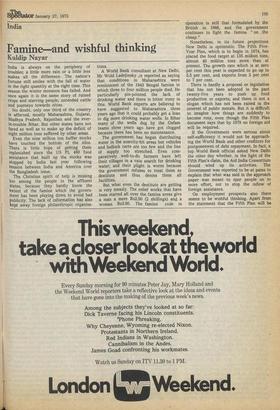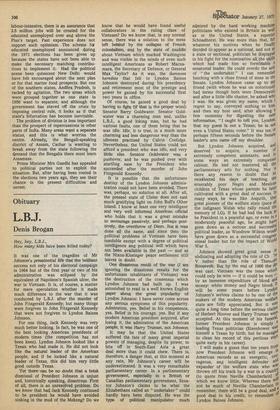Famine—and wishful thinking
Kuldip Nayar
India is always on the periphery of troubles; a little more rain or a little less makes all the difference. The nation's fortune still smiles with the fall of water in the right quantity at the right time. This season the winter monsoon has failed. And once again it is the same story of ruined crops and starving people; untended cattle and journeys towards cities.
No doubt, only one third of the country is affected, mostly Maharashtra, Gujarat, Madhya Pradesh, Rajasthan and the everin-trouble Bihar. But other states have not fared so well as to make up the deficit of eight million tons suffered by other areas.
Even the nine million ton buffer stocks have touched the bottom of the silos. There is little hope of getting them replenished since the US PL 480 food assistance that built up the stocks was stopped by India last year following tension between India and America over the Bangladesh issue.
The Christian spirit of help is missing too among the people in the affluent states, because they hardly know the extent of the famine which the government has been playing down to avoid bad Publicity. The lack of information has also kept away foreign philanthropic organisa
tions.
A World Bank consultant at New Delhi, Mr Wold Ladejinsky ,is reported as saying that conditions in Maharashtra were reminiscent of the 1943 Bengal famine in which three to four million people died. He particularly pin-pointed the lack of drinking water and there is bitter irony in this: World Bank experts are believed to have suggested to Maharashtra three years ago that it could probably get a loan to dig more drinking water wells. In Bihar many of the wells dug by the Oxfam teams three years ago have got clogged because there has been no maintenance.
The government has begun distributing water in the scarcity-hit areas but vehicles and bullock carts are too few and the line of supply too stretched. Even comparatively well-to-do farmers have left their villages in a vain search for drinking water; and their plight is worse because the government refuses to treat them as destitute and thus denies them all facilities.
But what even the destitute are getting is very measly. The relief works that have been started all over the famine areas give a man a mere Rs2.50 (2 shillings) and a woman Rs2.00. The famine code in operation is still that formulated by the British in 1888, and the government continues to fight the famine " on the cheap."
Nonetheless, in its future projections New Delhi is optimistic. The Fifth Five Year Plan, which is to begin in 1974, has placed the food target at 135 million tons, almost 40 million tons more than at present. The growth rate which is at zero per cent this year is expected to go up to 5.5 per cent, and exports from 2 per cent to 7 per cent.
There is hardly a proposal or legislation that has not been adopted in the past twenty-five years to push up food production or exports; and there is not a slogan which has not been raised in the interest of public morale. But it is difficult to imagine how things are suddenly to become rosy, even though the Fifth Plan document says that by 1979 no foreign aid will be required.
If the Government were serious about self-sufficiency it would not be approach ing the World Bank and other creditors for postponement of debt repayment. In fact, a top World Bank official asked New Delhi the other day whether, in the light of the Fifth Plan's claim, the Aid India Consortium should wind up its activities. The Government was reported to be at pains to explain that what was said in the approach paper was meant to spur people on to more effort, not to stop the inflow of foreign assistance.
On employment prospects also there seems to be wishful thinking. Apart from the statement that the Fifth Plan will be labour-intensive, there is an assurance that 2.5 million jobs will be created for the educated unemployed over and above the Plan's target. Past experience does not support such optimism. The scheme for educated unemployed announced during the 1971 elections has been given up because the states have not been able to make the necessary matching contributions to implement it. Had the political scene been quiescent New Delhi would have felt encouraged about the next plan or for that matter food prospects. But one of the southern states, Andhra Pradesh, is racked by agitation. The two areas which were grouped together as one state in 1956 want to separate, and although the government has staved off the crisis by imposing central rule, it looks as if that state's bifurcation has become inevitable.
The problem of division is less important than the prospect of repercussions in other parts of India. Many areas want a separate status, and this is what worries the centre. Already, the Bengali-speaking district of Assam, Cachar is wanting to break away from the state following the demand that the Bengalis there must learn Assamese.
Prime Minister Mrs Gandhi has appealed to political parties not to exploit the situation. But, after having been routed in the elections two years ago, they see their chance in the present difficulties and unrest.



































 Previous page
Previous page